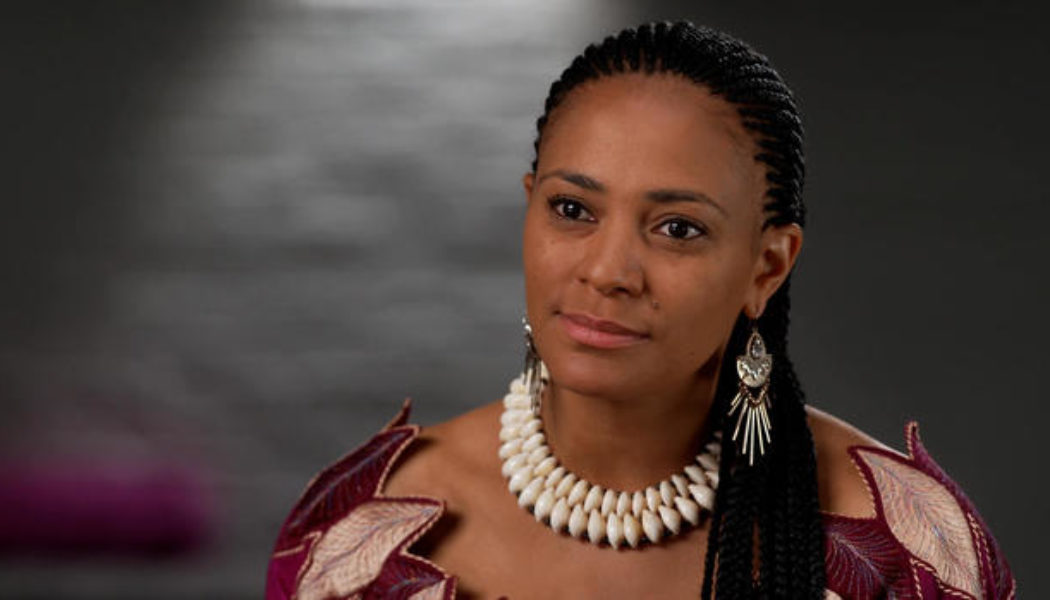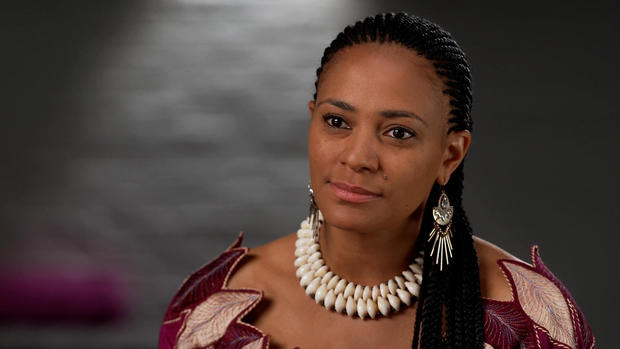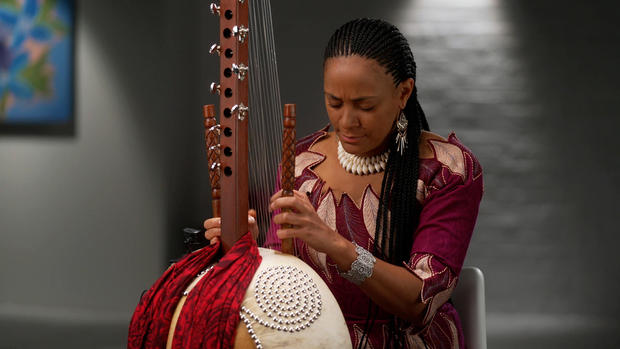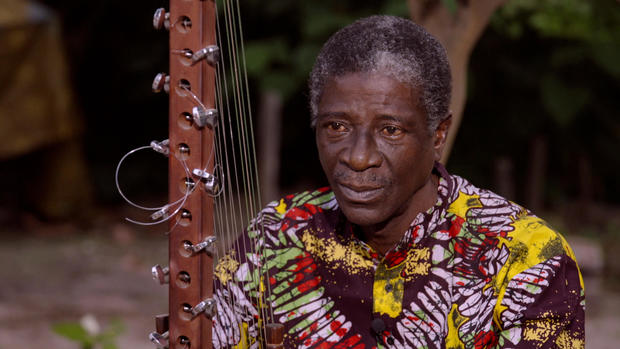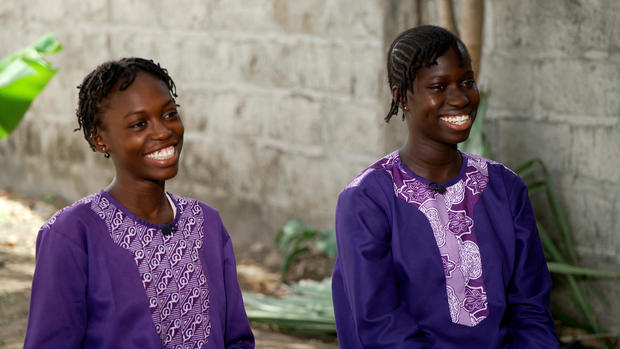This is an updated version of a story first published on Dec. 25, 2022. The original video can be viewed here.
Tonight we want to introduce you to a musician named Sona Jobarteh, who introduced us to the beautiful sound and story of a centuries-old instrument called the kora. It’s a string instrument from West Africa, part of a musical tradition that dates back to a 13th-century empire, and has been passed down strictly from father to son, man to man in a special set of families ever since. As we first reported last fall, Sona Jobarteh was born into one of those families, called griots.. the daughter of a Gambian father and a British mother. After hundreds of years of men, she is the first woman to master the kora. In her performances around the world — and in her work off-stage — she says she is keeping tradition alive.. through the very act of breaking it.
Take a listen, as we did, to Sona Jobarteh as she plays the kora. With its 21 strings, played by just four fingers, two on each hand, it has a sound both foreign and familiar.
Lesley Stahl: To me, it’s like a harp. What do you compare it to?
Sona Jobarteh: I don’t actually compare it to anything because it’s normal for me, right? I compare other things to the kora.
The song Sona played for us, called “Jarabi,” is a traditional love song sung in the Mandinka language. The tradition goes back to the 1200s, when a kingdom called the Mali Empire reigned over a large swath of West Africa, the territory of several modern-day countries. The musicians and storytellers in the empire were men called griots, who counseled kings, resolved conflicts and passed the legends down orally through the centuries. Women in griot families were singers, but it was only men who were allowed to play the instruments.
That is, until Sona Jobarteh. At 39, she has become one of the foremost kora players in the world, performing with her band across Europe, West Africa, and here in the United States, as we saw in one packed theater outside Boston.
Sona Jobarteh: This is music when you hear it, it still, to this day, carries this feeling of the empire at its– at its greatest. You get that feeling of royalty, you get that feeling of, you know, something that you’re so proud about.
Lesley Stahl: What I think about with you is that you have broken tradition.
Sona Jobarteh: It’s not the way I see myself, mainly because of the fact of — believing that tradition has to evolve. Traditions are not stagnant. They are things that grow with humanity, with socie– society, and they always have. At one time, this instrument was not around. And then it became invented and it became something modern. And yet, now it’s considered traditional. So in terms of me being female, this is a very central and important adaptation the tradition must take in order to be able to be relevant to our new society.
Sona Jobarteh comes to the griot tradition as both insider and outsider. Her mother is a British artist. Her father, the son of a legendary Gambian kora player whose griot family pedigree traces back to the 13th century. Though her parents’ relationship didn’t last, Sona grew up in both worlds, the U.K. and her grandfather’s family compound in the Gambia, where she says her grandmother urged her to embrace her griot heritage which, as a girl, meant singing.
Sona Jobarteh: She used to keep telling me, you know, “You have to sing.” And I never wanted to sing. I hated singing with a passion.
Lesley Stahl: Why? You have the perfect voice.
Sona Jobarteh: — didn’t like it. Never liked it. And so–
Lesley Stahl: But your grandmother knew you had great voice.
Sona Jobarteh: I don’t think she heard it much because I refused. And I was a very stubborn child (LAUGH) when it came to that. I would sit there for, “Nnnnn.”
But Sona was drawn to the kora, and as a little kid, no one seemed to mind her learning some of the basics. She thinks her grandmother may have even liked the idea. In the U.K., though, she studied a different musical tradition — classical cello — and she excelled, winning a scholarship at age 14 to a prestigious music boarding school.
Lesley Stahl: Were you one of the very few biracial kids in the school?
Sona Jobarteh: The only person of color in the first school.
Lesley Stahl: The only person?
Sona Jobarteh: Yes.
Sona Jobarteh: I was incredibly shy as a student. I never talked. That’s my own way of surviving those years, I would say.
Lesley Stahl: Were you sad? Was it a tough time?
Sona Jobarteh: Yes. It was a very tough time, yeah. Yeah. Happiness was not a major part of it.
But she did find one point of connection to her life in the Gambia.
Sona Jobarteh: The library in the school had a kora there, hanging on the wall. So I would be always looking at this thing. And then, one day, I decided to– to take it off the wall. It was a total mess, as you can imagine. So what I started doing was every time I get a little bit of time where the place is quiet, I would take it off the wall, fix a string, put it back. And I was doing it hoping nobody was gonna notice I keep taking it off the wall. And there was one lady who was one of the late, late night workers. She said, “Why don’t you take it to your room? And you can keep it there and just work on it.”
Lesley Stahl: She’s your hero.
Sona Jobarteh: –and I had the permission. It became my sanity.
And her calling. At 17, she decided she needed to study the kora properly, which meant taking a personal risk: appealing to her father to pass the tradition down to her, his daughter, as his father had to him. They hadn’t spent much time together, as Sanjally Jobarteh had been living and performing mostly abroad.
Lesley Stahl: For years and years and years, kora playing was passed father to son–
Sanjally Jobarteh: Mm-hm.
Lesley Stahl: –father to son.
Sanjally Jobarteh: Exactly.
Lesley Stahl: And along comes your daughter–
Sanjally Jobarteh: Yeah.
Lesley Stahl: Sona.
Sanjally Jobarteh: Yeah.
Lesley Stahl: Did she say, “Dad, will you teach me?”
Sanjally Jobarteh: Yeah, she said, “What I really want to learn is the kora.”
Lesley Stahl: But girls didn’t play the kora at that point.
Sanjally Jobarteh: What I told her– I said, “I would like– if I close my eyes, I don’t have to know the difference, is it a man or a woman.”
Lesley Stahl: Ooh.
Sanjally Jobarteh: “If you can do that for me.”
Lesley Stahl: You just immediately said, “Okay?”
Sanjally Jobarteh: I just immediately said, “Okay.”
Lesley Stahl: You never hesitated?
Sanjally Jobarteh: I never hesitated, no.
Sona Jobarteh: “I don’t want you to get distracted with this whole idea of being female. Don’t let that get into your head. Don’t let it dis– distract you. Your ambition needs to be a good kora player. Not female kora player, just a good kora player.” And so that was my challenge at the beginning.
Lesley Stahl: How hard did she work?
Sanjally Jobarteh: She worked very, very hard.
She started performing, sometimes with her father and then with her own band. She got acceptance first in Europe. And then back in the Gambia with a song and video she released in 2015 to celebrate 50 years of Gambian independence. It’s become the country’s unofficial national anthem, with more than 24 million views on YouTube.
Minus the dancers, we found the Gambia much as Sona’s video depicted it. A tiny country on Africa’s west coast, it’s a former British colony that’s predominantly Muslim. Pre-colonial culture runs deep here. Sona Jobarteh’s name and heritage carry weight and she’s leaning into that ancient griot role of cultural leader to advocate for what she calls her purpose in life outside music: creating a new model of African education. She has founded a small school called the Gambia Academy, where students study dance, drumming, kora of course, and another traditional griot instrument called the balafon.
Sona Jobarteh: The music gets the most attention because everyone sees it and likes and enjoys it. But they are learning all the same subjects as any other school is learning– your math, your science, your geography, your history, all these things. However, how is that imparted to you?
Sona believes most education in Africa has been so deeply rooted in colonial models that its message to children is that their own legacy is somehow backward.
Sona Jobarteh: So they feel to do things properly, “We’re gonna do it in this way.” And this– but “this way” is always very much a European way. My challenge is now can you get the same output, successful output, if we actually create– change the cultural orientation at the heart and center of the education system?
So the students here wear traditional African uniforms. And Gambian culture is celebrated. Rohy and Borry have been coming to the school since it opened seveb years ago. Here there are no restrictions by gender or pedigree. Rohy is learning to play the kora and Borry is in the advanced balafon class.
Borry: I like it. It makes me feel very happy when I’m playing.
Lesley Stahl: Are you griot?
Rohy: No.
Lesley Stahl: Are you griot?
Borry: No.
Lesley Stahl: And– you’re female. Look at you both laughing, because you know what I’m talking about.
Rohy & Borry: Yeah.
Lesley Stahl: Won’t that be awfully difficult?
Rohy: You know, what a man can do, a woman also can do it. Yeah. So I’m not from a griot family, but I love to play kora. And when you love something, you can do it.
Lesley Stahl: Are you getting pushback from within the society?
Sona Jobarteh: Yes. Of course. Especially from older generations. But– it doesn’t matter.
Sona’s first album was a mix of traditional and new songs. Her latest, which we saw her rehearsing with her band, is all original music. She writes all the parts herself — including songs about education, women and her own identity. And she sings them in Mandinka.
Sona Jobarteh: For me, when I sing in my own language, when I sing in the language that belongs to the Gambia, there is– I’m giving you a sense of pride that you never have before, that your language is as valuable.
Sona Jobarteh: When I can go to an international audience and I can have the whole audience in Germany, Spain, America, all over the world, and they’re singing Mandinka?
The power, she says, of music.
Sona Jobarteh: It becomes a universal language. I can talk with anybody from anywhere in the world using music. I can’t do that in any other form.
And she’s doing one more thing, passing the tradition down to her 15-year-old son Sidiki, a talented balafon player. And next link from the griot past to its future.
Lesley Stahl: You had said to her, “When I close my eyes, I don’t want to hear a female kora player.”
Sanjally Jobarteh: No.
Lesley Stahl: “I want to hear a great…”
Sanjally Jobarteh: “…kora player.” Yeah.
Lesley Stahl: Okay, so close your eyes and tell us what you hear.
Sanjally Jobarteh: I hear (LAUGH) a great, great, great kora player.
Sanjally Jobarteh: I’m very, very proud. Definitely.
Sona Jobarteh: Thank you so much.
In May, Sona Jobarteh was awarded an honorary doctorate from the Berklee School of Music, together with Usher and Roberta Flack. And her school, The Gambia Academy, is breaking ground this summer on a new and expanded campus.
Produced by Shari Finkelstein. Associate producers, Collette Richards and Braden Cleveland Bergan. Broadcast Associate, Wren Woodson. Edited by Daniel J. Glucksman.
